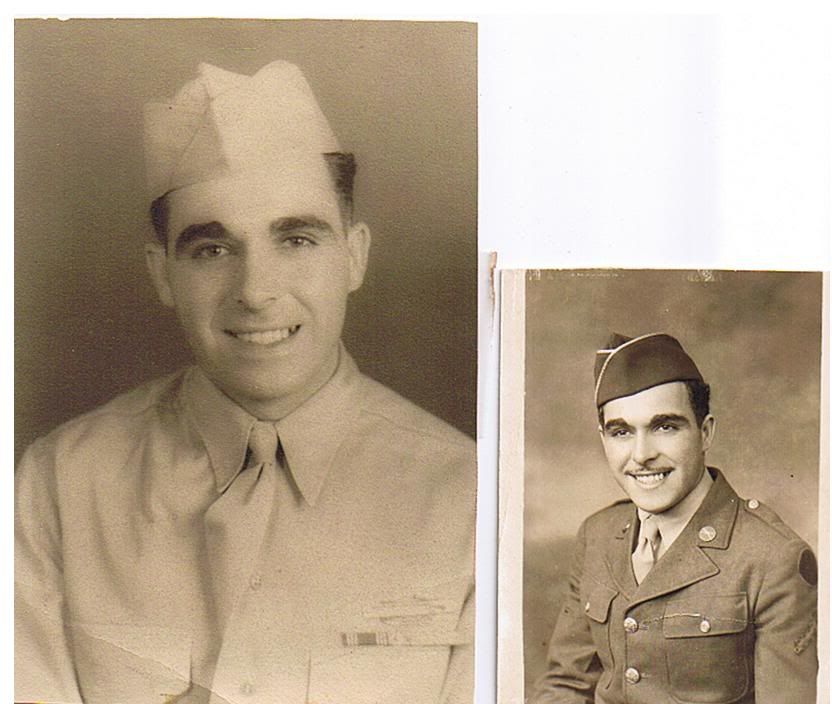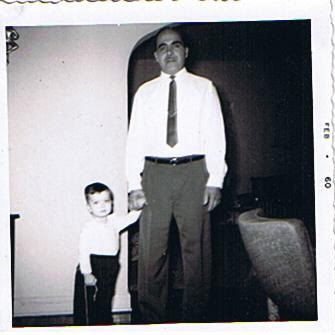Widebrim
I'll Lock Up
- Messages
- 6,557
My father, Tec 5 Lee Bartoletti, Sr., HQ, 3Bn, 17th Inf. Reg., 7th ID, US Army (1942-45).

The son of Italian immigrants (and proud of it), my father was born in 1918, and grew up mostly in Lake Ariel, Pennsylavania. Although my father was registered as a coal miner in PA, and therefore exempt from military service, he voluntarily gave up that exemption and volunteered for service in the Army. On Attu, his outfit's baptism of fire, he was on the receiving end of the first Japanese banzai against American troops. Before the banzai happened, my father led a night patrol into enemy lines, where those of the patrol saw Japanese troops, many of them drinking saki and literally foaming at the mouth, putting their wounded "to sleep." My father reported what they had seen to his Platoon Leader, but was told that he was mistaken, and that those must have been US troops he had seen in the dark. My father, going from foxhole to foxhole, none-the-less informed all the other men of his outfit that the Japnanese were up to something, and that they had better be prepared. The attack that followed left a bloody swath over 3 miles long, and was only stopped when the enemy was halted by the engineers and artillerymen. Likely due to my father's actions, though, the lives of many GIs were saved.
Besides Attu, my father saw action on Kwajalein Atoll, Leyte, and Okinawa. In addition, he made an amphibious landing at Kiska and served briefly in occupied Korea. His decorations and awards include: Purple Heart, Bronze Star, Asiatic-Pacific Service Medal with 4 battle stars and two amphibious arrowheads, Philippine Liberation Ribbon with two bronze stars, Presidential Unit Citation Ribbon, and CIB. (He was going to be put in for a Silver Star for his actions on Okinawa, but the officer who was going to recommend the medal was either wounded or killed during the campaign.)


After the war, he did as was expected, and went on with his life, rarely discussing the war with anybody (except me). Later in his life, he requested and received those medals which he had never been issued, and became a member of DAV, often attending (with me) Memorial Day services with his garrison cap, Ike jacket, and decorations. He was a proud Soldier, and was also proud that his son followed in his footsteps as an Army Infantryman. In addition, he was a true gentleman, one who taught us honor and loyalty. He is buried, wearing his Purple Heart, Bronze Star, and CIB, in the Riverside National Cemetary. John 3:16, Dad.

The son of Italian immigrants (and proud of it), my father was born in 1918, and grew up mostly in Lake Ariel, Pennsylavania. Although my father was registered as a coal miner in PA, and therefore exempt from military service, he voluntarily gave up that exemption and volunteered for service in the Army. On Attu, his outfit's baptism of fire, he was on the receiving end of the first Japanese banzai against American troops. Before the banzai happened, my father led a night patrol into enemy lines, where those of the patrol saw Japanese troops, many of them drinking saki and literally foaming at the mouth, putting their wounded "to sleep." My father reported what they had seen to his Platoon Leader, but was told that he was mistaken, and that those must have been US troops he had seen in the dark. My father, going from foxhole to foxhole, none-the-less informed all the other men of his outfit that the Japnanese were up to something, and that they had better be prepared. The attack that followed left a bloody swath over 3 miles long, and was only stopped when the enemy was halted by the engineers and artillerymen. Likely due to my father's actions, though, the lives of many GIs were saved.
Besides Attu, my father saw action on Kwajalein Atoll, Leyte, and Okinawa. In addition, he made an amphibious landing at Kiska and served briefly in occupied Korea. His decorations and awards include: Purple Heart, Bronze Star, Asiatic-Pacific Service Medal with 4 battle stars and two amphibious arrowheads, Philippine Liberation Ribbon with two bronze stars, Presidential Unit Citation Ribbon, and CIB. (He was going to be put in for a Silver Star for his actions on Okinawa, but the officer who was going to recommend the medal was either wounded or killed during the campaign.)


After the war, he did as was expected, and went on with his life, rarely discussing the war with anybody (except me). Later in his life, he requested and received those medals which he had never been issued, and became a member of DAV, often attending (with me) Memorial Day services with his garrison cap, Ike jacket, and decorations. He was a proud Soldier, and was also proud that his son followed in his footsteps as an Army Infantryman. In addition, he was a true gentleman, one who taught us honor and loyalty. He is buried, wearing his Purple Heart, Bronze Star, and CIB, in the Riverside National Cemetary. John 3:16, Dad.


